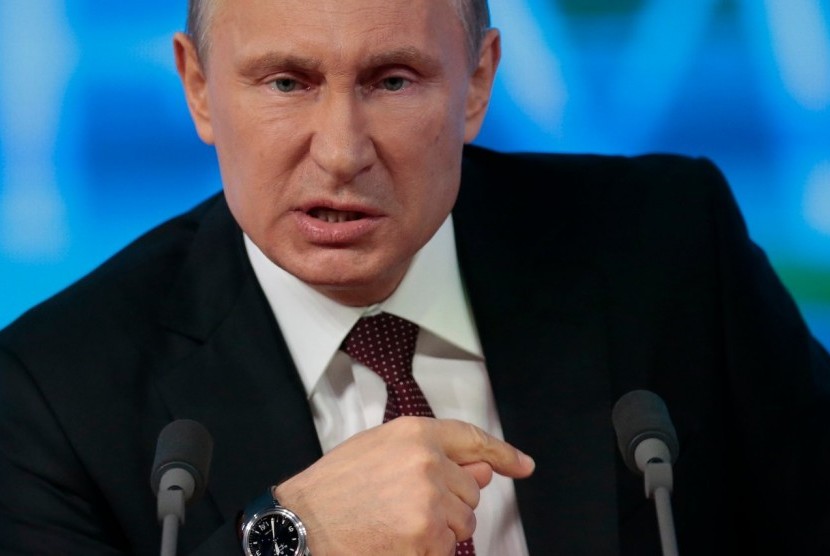REPUBLIKA.CO.ID, KIEV -- It is the ugly solution to the Ukrainian crisis world leaders will never acknowledge but grudgingly may have to accept.
Give Russian President Vladimir Putin Crimea -- and hope this sates his ambition of being remembered as the omnipotent leader who restored Moscow's post-Soviet might enough to leave the rest of Ukraine alone.
Such an appeasement strategy may not sit well with domestic critics of US President Barack Obama or former Soviet satellites in Eastern Europe that fear for their safety in the face of Putin's belligerence.
But no big nation seems willing to wage war against Putin's nuclear power in defence of Crimea -- a Russian-speaking peninsula Soviet leader Nikita Khrushchev gave to Ukraine as a "gift" in 1954.
And all would like to pull the rest of Ukraine out of the Kremlin's orbit and have a friendly power on Russia's western edge.
"The West might decide to hold its nose and look the other way with respect to the occupation, but only if Putin were to recognise the current Ukrainian government," said Rutgers University-Newark professor Alexander Motyl.
"He would have to provide very explicit guarantees and the West would have to specify just what consequences his violations of such an agreement would have," said the Ukrainian expert.
"Unfortunately, there is nothing in Putin's rhetoric or actions to suggest that he will stop at Crimea."
But James Nixey of London-based Chatham House countered that Putin "will not go any further -- that is highly unlikely -- (because) he has achieved what he wanted to achieve."
"Crimea is lost," Nixey told CNBC. "Crimea is gone."
This is not the West's public stance.
"If there is an annexation of Crimea, a referendum that moves Crimea from Ukraine to Russia, we won't recognize it," US deputy national security adviser Tony Blinken told CNN.
And German Chancellor Angela Merkel -- one of Western Europe's more cautious leaders when it comes to imposing punitive measures on Russia -- bluntly told Putin that Crimea's March 16 referendum on joining Russia was "illegal".
The tiny Baltic nations that the Soviet Union claimed during World War II are particularly anxious.
Lithuanian President Dalia Grybauskaite urged EU leaders attending an emergency summit in Brussels to "realise that what Russia is doing now is an attempt to redraw the post-war map and borders".
But some analysts believe Putin's main goal is to "punish" Ukraine's new leaders while at the same time preserving some semblance of working relations with the West.
"For Russia to lose influence over Ukraine may be one thing, but losing its grip on Crimea and hence sufficient access to one of its two major fleets is one entirely different ball game and, it seems, just too much to stomach," said Erik Nielsen of Italy's UniCredit global bank group.
Nielsen suggested Putin wanted to "punish Ukraine as a whole for its Western leaning -- but, importantly, all to an extent and in a way that would not escalate the inevitable tensions with the West beyond politically and economically acceptable levels."
Moscow has offered sweeteners to Crimeans such as higher social benefit payments that make the predominantly ethnic Russian region of two million people highly likely to vote "yes" on joining Kremlin rule.
But most believe the West will never recognise the Black Sea region's accession to Russia even while tacitly accepting it as a fait accompli.
Steven Pifer of the Washington-based Brookings Institution argued that anything short of a firm global indictment of the annexation would only feed Putin's hunger to meddle further in both Ukraine and other ex Soviet states.
"I believe it would be a mistake for the West to 'accept' Russia's annexation of Crimea in the hope that Putin would then leave the rest of Ukraine alone," said the former US ambassador to Ukraine.
The United States in particular is hopeful that the promise of greater autonomy from Kiev -- the second option facing Crimean voters at the referendum -- may still save Ukraine's territorial integrity and scupper Russia's expansionist plans.
"I have been encouraged to see comments from Prime Minister (Arseniy) Yatsenyuk and others indicating that the Ukrainian government is open to enhanced levels of autonomy for the people of Crimea," US ambassador Geoffrey Pyatt told reporters in Kiev.
"But this is something that Ukrainians have to decide within their own constitutional framework and it cannot happen under the barrel of a gun." Yet others fear that global stability in the post-Cold War era has already been undermined by the West's seeming inability to protect Ukraine despite being obliged to do so under a 1994 agreement that saw Kiev cede its Soviet nuclear arms.
"Ukraine gave up its nuclear weapons in exchange for guarantees of its security and territorial integrity," said Lilia Shevtsova of the Carnegie Moscow Centre.
"It means that the whole nonproliferation regime may collapse. From now on, states will attempt to gain access to nuclear weapons and will not give them up."


